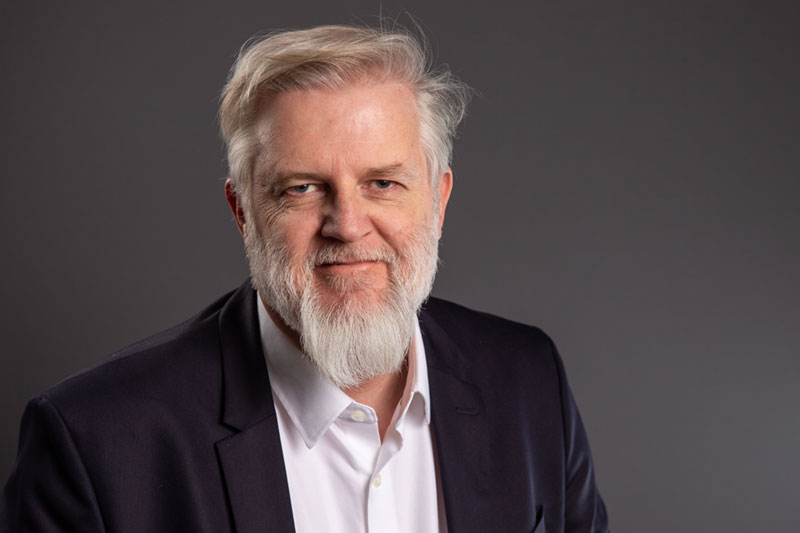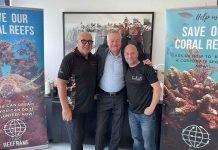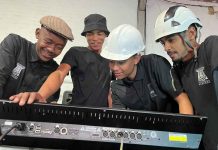What position is the company in compared to where it was before the COVID-19 pandemic?
We’re back up to around 75% of the team we had before, but we’re matching our pre-COVID-19 levels of revenue. How? Because we’ve organised. We took the opportunity to look at how our technical structure was as a whole and we’re now working in a much more joined-up way – not just here in the Middle East but across the entire global network.
Here in Dubai, we’ve still got the two sides of the business – venues and staging services – but we work in a much more integrated way. There’s a central team and all the resources now come out of one warehouse. Lee Worthington has been promoted into that role looking after the warehouse and logistics side of the business, and we’re now a much slicker, smoother operation as a result.
The fact that every freelancer, labour, and sub-hire requirement is all managed out of one office brings us increased efficiencies. For example, where previously we would have had two project managers on separate sides of the business working independently and not being aware of the details of each other’s project requirements, now everything is combined, we can allocate resources in a much more efficient way.
How did you hit upon this more efficient way of working?
We knew that the venues and staging services business would end up as one team, but we just needed to find a way to do it that worked for us. We had many discussions with our colleagues in the US as well as EMEA, and we took all the best parts of those working practices and rolled them out to find a model that works well for everybody.
Last week, for example, we had 15 production jobs all on the same day. Previously this would have been very difficult to achieve, but because the pre-production had been done in such an efficient way, it enabled us to do all those jobs, with people and kit moving between seamlessly – and all without people having to do crazy hours like they once would.
Have you seen other benefits from being a part of the wider Encore family?
Being part of the Encore family has enabled us to look at things differently. The industry is in the middle of a resources challenge in terms of both people and equipment. In terms of equipment, we’re seeing long lead times on new orders. However, the size and scale of the company means we’re able to make that long-term commitment and place an order now with the knowledge that when the equipment is delivered in nine months or so, we’ll be in a position to make best use of it.
In terms of people, we’re still a little bit below where we wanted to be from a headcount point of view. However, we hope to be back to our pre-pandemic numbers by around the end of the year, which is faster than we had initially predicted.
There is still a shortage of freelancers, which creates further resource challenges. We’ve lent on our international partners for resources during our busy season and this summer will see some of our team head to the UK during the busy festival season over there. It’s all about making best use of the resources we have across the global family.
How are you working on bringing new blood into the industry?
We have expanded our outreach programme across Europe, so we’re all working together as one to offer people who are interested in getting into the industry a taste of the Encore organisation not only in their home country. It shows people that there are opportunities in places other than where they grew up or studied.
One of the great things about our industry is that you don’t necessarily need a university degree or even a high-school certificate to work in it. Of course, it often helps, but if someone has the right mindset, enthusiasm and capacity for learning, this industry is open, and they have every chance of doing well in it.
We need to be open and to build the diversity of the organisation. Here in the Middle East, we’re one of the most diverse globally, which reflects Dubai in general. We’re at 27 nationalities out of around 150 staff, and that multicultural, multinational team creates an engaging and positive working environment where everyone can learn from each other.
How has the UAE market reacted to the end of Expo 2020?
We anticipated that Expo 2020 would see a spike in revenue for the venues side of the business, and that certainly happened as predicted. Since Expo finished at the end of March, we’ve seen a steady continuation of growth, with no drop-off at all – we even made a profit during Ramadan, which is not easy to do.
The freelance market remains a challenging one, as many of the freelancers who were busy working on Expo have either moved back to their home countries or taken up roles in Saudi Arabia – a market that is growing at pace thanks to the huge scale and number of events taking place there throughout the year.
What’s the outlook for Encore in Saudi Arabia?
We’ve done a few projects in Saudi Arabia but that hasn’t been our focus. Why? Because lots of companies from the UAE have switched their attentions to Saudi and left an open market here, and we are very happy to service this market where we’ve built a reputation over many years.
There’s no doubt that Saudi is growing massively and that’s a good thing for everyone. History tells us that if we’re all working, the industry is stronger. Let’s all rejoice in that – especially after the COVID-19 years.
We’re still looking at our options of how we’re going to proceed in the Kingdom. We’re not going to go crazy investing in the country in the next year, but with the number of venues that will be opening in Saudi Arabia during the next two or three years, it’s inevitable that our brand partners will want us to be there, so we must be sure that we’re able to service that demand.
What is the split between the venues and staging services sides of the business, and where do you see the biggest potential for growth?
Our staging business has historically been bigger than our venues business, but it’s now around equal. The staging side of the business is still growing, but venues is showing a significant uptick – partially down to the Expo 2020 effect.
We’re still the dominant player in the venues space, with 37 hotels in the UAE, while our nearest competitor is in two or three. Extend that to the global network and we’re in 2,000-plus hotels worldwide, with global contracts with some of the biggest hotel brands, which is driving growth of additional venues here.
There is also growth potential in our production and staging offering. We have clients we’re already working for who we could be doing more work for, and we have international arrangements with clients that will now start being applied to this region.
What are you plans in the short and long term?
Short term, we aim to use the resources we have available to continue to build the markets we already know well. Longer term, we’ll be looking to extend our presence across the region in a more structured way, whether that is Saudi Arabia, Kuwait, Qatar, Bahrain, Oman or further – anything is possible. That’s one of the good things about being part of Encore; we’re allowed to dream and think on a large, global scale.
Photos: Encore




